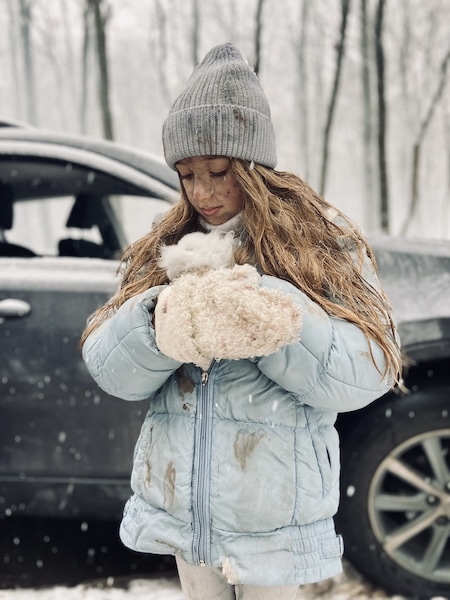This post was originally published on Eco Watch
The full-scale invasion of Ukraine by Russia more than three years ago and the ongoing war has led to the confirmed deaths of thousands of people, displaced millions and caused millions more to seek refuge in other countries.
But it isn’t just humans who are impacted by the war. Millions of animals — both pets and wildlife — have been killed. In occupied and frontline regions, animals must try to survive while facing stress, hunger and constant danger. Their homes and ecosystems have been destroyed and polluted, while those who cared for them have sought refuge in shelters or ended up on the streets themselves.
A Ukrainian-German film anthology, Animals in War tells the stories of animals who have had their lives turned inside out by war. The seven short films in the collection had their world premiere at the international independent Tribeca Film Festival in New York on June 8. Most of the stories were based on true events. The collection encompasses various narrative styles and genres centered around one common theme — compassion.
All stills from the film and behind-the-scenes photos provided by the film’s press service.
“Animals in War is a poignant anthology film inspired by true stories of animals affected by the war in Ukraine. A collaboration between Ukrainian and international artists — including actor and activist Sean Penn — the film serves as a haunting yet deeply moving call for global awareness and empathy,” Casey Baron, a programmer with the Tribeca Film Festival, wrote on the festival website. “Featuring a white rabbit, a wolf, a cow and other animals as central figures of each story, the film employs a range of artistic styles to explore the war’s often overlooked ecological impact. Through these powerful vignettes, Animals in War is a compelling work that highlights the widespread devastation wrought by the conflict and issues an urgent plea for compassion, reflection and action.”

Roughly 500 filmmakers from Ukraine and other nations spent two years developing the anthology, which was produced by Oleksiy Makukhin and Oleg Kokhan, a press release for the film said. Ukrainian filmmaker Myroslav Slaboshpytskyi directed the opening episode. Slaboshpytskyi’s film The Tribe was featured at more than 100 film festivals globally. The film’s soundtrack features “Burn Out” by American band Imagine Dragons.
Social initiative Save Pets of Ukraine, which is part of the international nonprofit U-Hearts Foundation, partnered with the project. U-Hearts Foundation was founded three years ago by Kormotech, a Ukrainian pet food manufacturer. The foundation collects donations from international supporters and channels them toward animal welfare organizations, volunteers and shelters in Ukraine working to save animals impacted by the war.

“The way a nation treats animals is a clear marker of its level of civilization, and the test of humanity that we face daily reveals our values just as much as military victories,” said Kokhan, who also created the film. “Our collaboration with Save Pets of Ukraine and Kormotech is a vivid example of how socially responsible business and the arts can work together effectively to amplify these urgent topics and resonate with audiences around the world.”
Public attention is not often focused on how much war impacts animals. Official statistics on animals in the Ukraine war are still only available for 2022. The country’s Ministry of Agrarian Policy and Food estimates that approximately six million domestic animals perished in the war that year.

A 2023 study by Kormotech and Save Pets of Ukraine found that the number of animals being cared for by animal welfare volunteers and in shelters had surged since the war began — by 100 percent or more in frontline shelters, by 60 percent among volunteers and by 20 to 30 percent in areas not directly on the front lines.
In 2023, almost 20,000 cats and 26,000 dogs were being cared for by volunteers and in shelters in Ukraine, and the numbers have continued to rise.

The destruction of ecosystems has been another devastating effect of the war. From ruined nature reserves, polluted water bodies and mined forests, the war has been depriving wildlife of their natural habitats while making it impossible for many animals to survive.
Animals in War shows the war as a humanitarian as well as an ecological disaster without borders, relevant to the whole world. The anthology’s creators convey this message through suffering animals caught in the middle of a human conflict, rather than through scenes of combat.

“Animals in War draws attention to a crucial yet often overlooked aspect of war — its impact on the environment and animal life,” said Rostyslav Vovk, co-founder and CEO of Kormotech. “For us, supporting the creation of Animals in War is a natural extension of our mission as a pet food producer: to foster a responsible attitude toward animals and to make their lives better.”
As part of the release of Animals in War, Save Pets of Ukraine has launched the “We save animals — animals save us” campaign to raise funds for the U-Hearts Foundation in support of animals in Ukraine.
The post ‘Animals in War’ Film Anthology Tells Stories of Animals and Ecosystems Impacted by Russia’s War on Ukraine appeared first on EcoWatch.





0 Comments